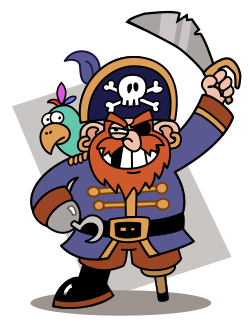International Talk Like a Pirate Day
This article may need to be rewritten to comply with Wikipedia's quality standards. |

International Talk Like a Pirate Day (ITLAPD) is a parodic holiday invented in 1995 by John Baur ("Ol' Chum Bucket") and Mark Summers ("Cap'n Slappy"), of the United States, who proclaimed September 19 each year as the day when everyone in the world should talk like a pirate.[1] For example, an observer of this holiday would greet friends not with "Hello", but with "Ahoy, me hearty!" The date was selected because it was the birthday of Summers's ex-wife and consequently would be easy for him to remember.[1]
Background
At first an inside joke between two friends, the holiday gained exposure when Baur and Summers sent a letter about their invented holiday to the American syndicated humor columnist Dave Barry in 2002.[2] Barry liked the idea and promoted the day.[2] Growing media coverage of the holiday after Dave Barry's column has ensured that this event is now celebrated internationally.
Baur and Summers found new fame in the 2006 season premiere episode of ABC's Wife Swap, first aired September 18, 2006. They starred in the role of "a family of pirates" along with John's wife, Tori.[3]
Actor Robert Newton, who portrayed Long John Silver in the 1950 Disney film Treasure Island, is the patron saint of Talk Like A Pirate Day.[1] As the association of pirates with peg legs, parrots and treasure maps was popularized in Robert Louis Stevenson's novel Treasure Island (1883), the influence of Stevenson's book on parody pirate culture cannot be overestimated.[4]
Examples of pirate sayings

Treasure Island
One of the most influential books on popular notions of pirates was Treasure Island, a novel by Robert Louis Stevenson, from which sample quotes include:
- "Bring me one noggin of rum, now, won't you, matey."[5]
- "Avast, there!"
- "Dead men don't bite."
- "Shiver my timbers!" (often pronounced as "Shiver me timbers!")
- "Fifteen men on the dead man's chest -- Yo-ho-ho, and a bottle of rum!" (see Dead Man's Chest)[6]
- "There! That's what I think of ye. Before an hour's out, I'll stove in your old block house like a rum puncheon. Laugh, by thunder, laugh! Before an hour's out, ye'll laugh upon the other side. Them that die'll be the lucky ones."
The archetypal pirate grunt "Arrr!" (alternatively "Rrrr!" or "Yarrr!") first appeared in the classic 1950 Disney film Treasure Island, according to research by Mark Liberman.[7] His article cites linguistic research that may locate the roots of this phrase much earlier.
Peter Pan
Peter Pan, with Captain Hook and his pirate ship Jolly Roger, contains numerous fictional pirate sayings:
- "Avast belay, yo ho, heave to,
- A-pirating we go
- And if we're parted by a shot
- We're sure to meet below!"
- "Yo ho, yo ho, the pirate life,
- The flag o'skull and bones
- A merry hour, a hempen rope,
- And hey for Davy Jones."
- Yarrrr!!!!!!! Scally Wag
Derivatives
- The holiday is of particular importance to Pastafarians (those who follow the teachings of the Church of the Flying Spaghetti Monster) who consider pirates to be absolute divine beings and the original Pastafarians.[8]
- Tom Smith has written and recorded the song "Talk Like a Pirate Day," the quasi-official anthem of the holiday.[9]
- In the online single-player RPG Adventure Quest there is a Talk Like a Pirate Day challenge.[10]
- In the Nintendo DS version of The Sims 2, in-game characters celebrate "Talk Like A Pirate Day" on September 19th, in which a special quest is released, involving a pirate quiz.
- On Neopet's Neoboards, during the holiday, filters automatically changed words like "see" to "spy" and "n00b" to "landlubber".[11]
- This holiday inspired the creation of the Day of the Ninja in 2003.[12]
- In Sid Meier's Pirates! (2004), narration and character dialogue is altered to honor "Talk Like A Pirate Day" if the system's date is set to September 19th.[13]
- The MMORPG Kingdom of Loathing celebrates Talk Like a Pirate Day, and a new item may drop in the game's pirate-themed zone, for that day only.
See also
References
- ^ a b c The Original Talk Like A Pirate Day Web site, by John Baur and Mark Summers.
- ^ a b Dave Barry, "Arrrrr! Talk like a pirate—or prepare to be 'boarded'". 8 September 2002.
- ^ Wife Swap, from ABC Medianet.
- ^ David Cordingly (1995). Under the Black Flag: The Romance and Reality of Life Among the Pirates. ISBN 0679425608
- ^ Excerpt from Treasure Island
- ^ Excerpt from Treasure Island
- ^ Mark Liberman, "R!?". Language log, 19 September 2005.
- ^ Open Letter to the Kansas School Board
- ^ * Talk Like A Pirate Day song (MP3), by Tom Smith
- Talk Like A Pirate Day song (lyrics), by Tom Smith
- ^ AdventureQuest Events
- ^ New Features on Neopets: 19th September
- ^ Day of the Ninja Site
- ^ GameSpot on Sid Meier's Pirates! (2004)
Further reading
- Harland, John (1984). Seamanship in the Age of Sail. Provides a detailed account of the language used by seamen during the age of sail. ISBN 0-87021-955-3
External links
Support groups
- The Original Talk Like A Pirate Day Web site, by John Baur and Mark Summers.
- Talk Like a Pirate Day Web site
- Talk Like A Pirate Day Web site, UK.
- Talk Like A Pirate Day Web site, Australia.
- Talk Like A Pirate Day Web site, NL.
Multimedia
- TLaPD Flashmob Gallery, Vancouver 2006.
- Talk like a pirate video clip collection, Video clip collection.
- Audio Interview on The Sound of Young America: MP3 Link
- Animated Pirate Translator.
- Flickr TLaPD photos
